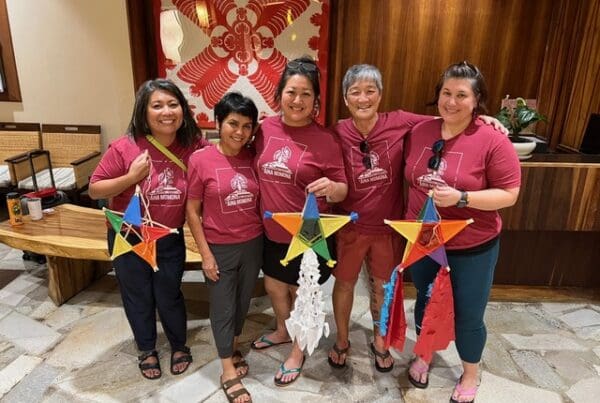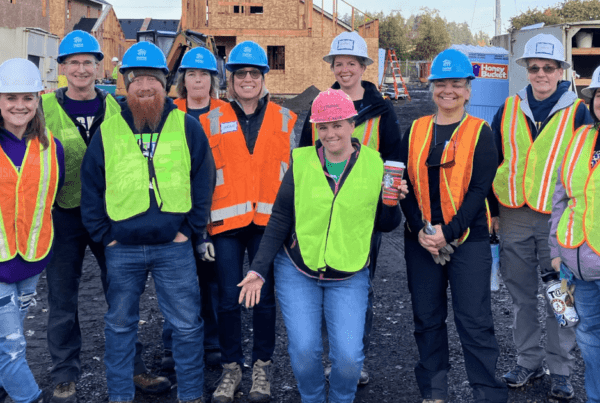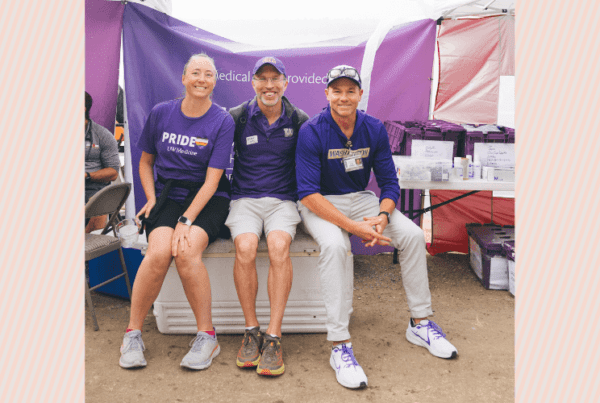Highlights | Safe, Healthy, Empowered
- The SHE Clinic at Aurora Commons provides low-barrier care for cisgender and transgender women who live and work on North Aurora.
- Many patients are unhoused and have substance use disorders, mental health issues and other chronic conditions, and some are engaged in survival sex work.
- Accepting walk-ins, helping patients access other resources and providing trauma-informed care are critical to the clinic’s success.
Many cisgender and transgender women who live and work on North Aurora Avenue face significant challenges to accessing healthcare, including trauma, houselessness, stigma from sex work and more.
Shireesha Dhanireddy, MD, medical director of UW Medicine’s Infectious Diseases Clinic and assistant medical director of the Madison Clinic, and Sparrow Etter-Carlson, founder of Aurora Commons for unhoused people, wanted to see how they could work together to address the healthcare needs of the community.
Dhanireddy had learned that the women accessing the services at the Commons were not seeking medical care, and many expressed feeling stigmatized by their interactions with the healthcare system.
The solution: The SHE Clinic, which stands for Safe, Healthy and Empowered. The clinic opened in 2018 and is a partnership with Harborview Medical Center.
A low-barrier approach
The team at Aurora Commons surveyed the women around North Aurora about what they would need from a clinic, then used their input to inform how the SHE Clinic operates.
This includes making care low-barrier and easy to access by not requiring appointments and recognizing that patients may need extra help because they might not have things like cell phones or access to reliable transportation.
“When their care needs extend beyond what we can offer in our clinic room, we can help to minimize some of the other barriers by arranging transportation, picking up their meds for them and scheduling specialty or referral appointments while they are still with us,” says Maggie Green, MD, an infectious disease doctor who sees patients at the SHE Clinic and elsewhere across UW Medicine.
While accessing the clinic’s services, patients can also take advantage of the convenient location in Aurora Commons by getting food at their kitchen, using the restroom, connecting with community and selecting new clothes from donations made to the Commons.
“Aurora Commons is set up to feel comfortable, like a home with a living room and a kitchen,” says Jessica Carrico, RN, who works at the SHE Clinic as well as Harborview Outpatient Clinics. “Aurora Commons and SHE Clinic staff have worked hard to ensure that the clinic area mimics this homey feel, so patients aren’t triggered by a clinical-feeling space, since many of our patients have had traumatic and stigmatizing experiences in traditional healthcare settings.”

Team members at the SHE Clinic.
Trauma-informed care
Compassion and being nonjudgmental are at the heart of the clinic’s approach to care.
The women who seek care at SHE clinic have all experienced trauma, and most have experienced complex trauma starting in early childhood. As is often seen with untreated complex trauma, many of the women have overlapping substance use disorders, mental illness and other chronic health problems.
“We have learned that by providing care with a trauma-informed, harm-reduction focus we can meet our patients where they are that day and show them that they matter to us,” Green says.
This care approach includes empowering patients to set their own goals for clinic visits and set boundaries; asking patients before touching them; keeping a door open in the room; and giving patients breaks during longer appointments.
Managing secondary trauma for the clinic providers is important too, Green says, since many of their patients have complex and dangerous lives. It can be hard, but the team supports each other and recognizes the impact their work has on their patients and the community.
Building lasting relationships
For Dhanireddy, one of the most rewarding parts of working at the clinic is how women who have experienced trauma start to open up and share their stories.
“Over the past few years, we have been able to laugh and cry with many of these women. One of my first interactions at SHE Clinic was when a woman said, ‘You don’t seem like a doctor because you are actually listening to me and I don’t feel judged,’” Dhanireddy says.
While building trust with the women who come to the clinic takes time and effort, that effort also pays off. It allows the SHE Clinic team to provide care to women who may not otherwise be able to access it.
“Each week for the past nearly four years we have seen at least one new patient who otherwise might not have accessed care, and we have several that continue to come back to be seen even after they’ve gotten housing far away. I think this is the most demonstrative measure of the success of this model of care delivery,” Green says.
Accessing care at the SHE Clinic
People who need care can access the SHE Clinic’s services from 11 a.m. to 2 p.m. on Wednesdays and Thursdays. Walk-ins are welcome.
Photo caption: Aurora Commons, the site of the SHE Clinic


